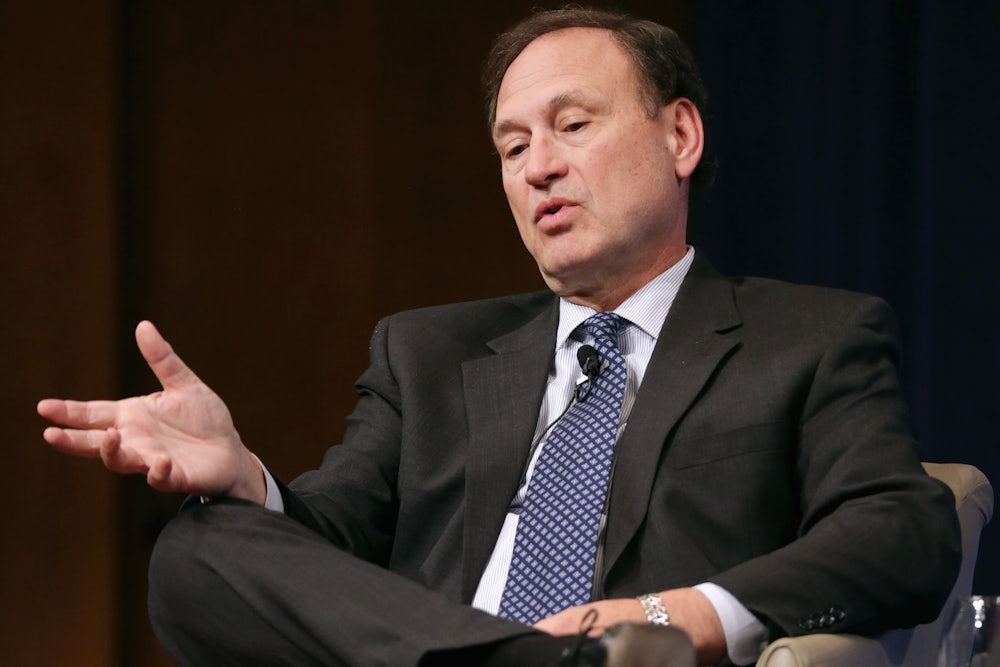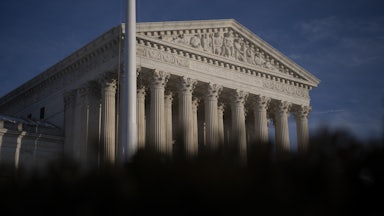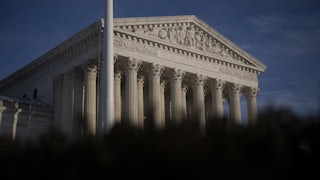As the Supreme Court weighed the Dobbs v. Jackson Women’s Health Organization case in 2021 and 2022, civil rights advocates noted that this would be no narrow ruling—and that the fallout from overturning Roe v. Wade would go way beyond abortion. After all, there were numerous legal matters inextricably tied to the Roe precedent, including the right to birth control and marriage equality. In his majority opinion, Justice Samuel Alito attempted to reassure people that no other rights were at risk. He wrote: “To ensure that our decision is not misunderstood or mischaracterized, we emphasize that our decision concerns the constitutional right to abortion and no other right. Nothing in this opinion should be understood to cast doubt on precedents that do not concern abortion.”
That was a lie. The February 2024 Alabama Supreme Court ruling declaring that embryos should be considered people under wrongful death laws, and which halted in vitro fertilization treatments, cited Dobbs multiple times. And we’re seeing another instance of Dobbs’s repercussions in a pending case about sex discrimination in medical care. If the high court accepts these arguments, it could have wide-ranging effects.
One of the biggest Supreme Court cases this term, U.S. v. Skrmetti, is about whether bans on gender-affirming care for minors amount to unconstitutional sex discrimination. The plaintiffs—three Tennessee transgender youth and their families—argue that the state law clearly discriminates based on sex because it bans medical providers from prescribing puberty blockers and hormone treatments to transgender youth but allows those same therapies for cisgender kids. (To put a finer point on it, under the law, Senate Bill 1, a minor assigned female at birth can take estrogen, while a minor assigned male cannot.) The Department of Justice argues that the Tennessee law violates equal protection rights under the Fourteenth Amendment.
In a brief filed on Tuesday afternoon, Tennessee’s Republican Attorney General Jonathan Skrmetti chillingly cited Dobbs more than 10 times to argue that its law is a mere regulation of medical care and doesn’t discriminate based on sex. (The Dobbs opinion made the same claim about the Mississippi abortion law in the case.) More specifically, Tennessee claims that S.B. 1 isn’t discriminatory because it only restricts these treatments if the end goal is to transition to a different sex. Skrmetti writes:
The provision of testosterone to boys “to treat a minor’s congenital defect, precocious puberty, disease, or physical injury,” Tenn. Code Ann. §68-33-103(b)(1)(A), does not serve the same medical purpose as the provision of testosterone to a girl who wants to transition. The same drug is at issue. But it is used at different dosages and for different medical purposes.
But Michelle Banker, senior director of reproductive rights and health litigation at the National Women’s Law Center, said Tennessee is “just flat wrong on the law to be relying on Dobbs in this way.” And the error can be traced back to Justice Alito himself.
In what essentially amounts to an aside in the text of the Dobbs decision, Alito wrote that state abortion bans don’t violate the equal protection clause, even though that was not an official question in the case. “The [equal protection] discussion in Dobbs is what we call ‘dicta,’ meaning that it doesn’t have the force of law because the issue wasn’t before the court,” Banker said. “The court had no business making a statement about it in that case, and courts shouldn’t be relying on it now.” (Unfortunately, it’s not the only instance of extraneous Alito comments setting a trap for people’s rights—the same can be said of the 2014 Hobby Lobby case about birth control.) In this same section, Alito cited a 1974 case, Geduldig v. Aiello, which held that pregnancy discrimination didn’t violate equal protection. Banker said the reasoning Alito applied in invoking Geduldig has been “rejected over and over,” but Tennessee cites it several times as well.
If the Supreme Court blesses this line of reasoning, states could use the precedent to attack other forms of health care. Banker said that Tennessee’s argument could have “really radical implications”—and pointed to birth control, as well as certain fertility treatments that would likely end up endangered.
Gillian Branstetter, a communications strategist at the American Civil Liberties Union, underscored that allowing politicians to regulate medical care based on sex is a risk for people who aren’t trans. “There really is no such thing as regulating other people’s lives because of who they are—you’re opening the door for the state to do the same thing to you,” Branstetter said. “The attacks are already escalating into things like IVF access and other reproductive health care. It’s not hard to imagine how it would then escalate into things like contraceptive access.”
Branstetter noted that solidarity is key: “The goal is for other people to be so afraid of transgender people’s freedom that they’re willing to sacrifice their own.”
The various right-wing playbooks against bodily autonomy have overlapped for years. There are already cases moving through the court system concerning minors’ right to access birth control without involving their parents. Earlier this year, the Fifth Circuit ruled in favor of a conservative father who said a federal program offering contraception without parental consent violated his parental rights. The conservative blueprint Project 2025 wants a future Trump administration to target insurance coverage of emergency contraception, and we could also see states passing laws restricting minors’ access to those pills and to IUDs.
The right to use birth control, in particular, is usually discussed in the context of what’s known as substantive due process reasoning—not the equal protection rights at issue in the Tennessee case. Justice Clarence Thomas notably wrote in a Dobbs concurring opinion that he hoped the court would revisit other landmark precedents that relied on substantive due process, like Griswold v. Connecticut on birth control, Lawrence v. Texas on same-sex intimacy, and Obergefell v. Hodges on marriage equality. (Thomas conspicuously didn’t mention Loving v. Virginia, which protects interracial marriages, perhaps because he is married to a white woman.) But a steady chipping away at the right to birth control, starting but not ending with young people, could lead to a future where the Supreme Court overturns Griswold—we saw this strategy in the decades-long fight against Roe.
The Skrmetti case has not yet been scheduled for argument, but when the court does hear it, it’s likely that many media outlets will depict it as a case only about transgender people. Such framings will require substantial pushback—as history has shown us, all of our rights are intertwined.










